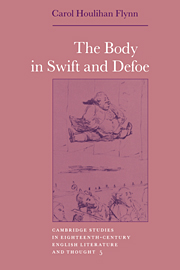Book contents
- Frontmatter
- Contents
- Acknowledgments
- List of abbreviations
- Introduction “The Dearness of things”: the body as matter for text
- 1 Dull organs: the matter of the body in the plague year
- 2 The burthen in the belly
- 3 Consuming desires: Defoe's sexual systems
- 4 Flesh and blood: Swift's sexual strategies
- 5 The ladies: d—ned, insolent, proud, unmannerly sluts
- 6 Chains of consumption: the bodies of the poor
- 7 Consumptive fictions: cannibalism in Defoe and Swift
- 8 Vital parts: Swift's necessary metaphors
- Afterword Suppose me dead; and then suppose
- Index
4 - Flesh and blood: Swift's sexual strategies
Published online by Cambridge University Press: 21 September 2009
- Frontmatter
- Contents
- Acknowledgments
- List of abbreviations
- Introduction “The Dearness of things”: the body as matter for text
- 1 Dull organs: the matter of the body in the plague year
- 2 The burthen in the belly
- 3 Consuming desires: Defoe's sexual systems
- 4 Flesh and blood: Swift's sexual strategies
- 5 The ladies: d—ned, insolent, proud, unmannerly sluts
- 6 Chains of consumption: the bodies of the poor
- 7 Consumptive fictions: cannibalism in Defoe and Swift
- 8 Vital parts: Swift's necessary metaphors
- Afterword Suppose me dead; and then suppose
- Index
Summary
For fine Ideas vanish fast,
While all the gross and filthy last.
“Strephon and Chloe,” Poems II, 591, lines 233–4Unlike Defoe dreaming Moll's escape from Roxana's nightmare, Swift cannot even begin to imagine women from the inside. Keeping his ironic distance, he flails and strips “the sex” to get at the truth of its loathsome condition. The knowledge he produces is always external and judgmental. For reasons cultural as well as psychological, Swift defines women according to a physicality that is gross, filthy, and lasting. Women threaten to scatter reason, waste energy, and destroy the possibility of civilization. The disorderly energies that Swift so actively invokes in his fictional explorations of women must be repressed or denied to be endured. In the end, he can only run from the engrossing feminine temptations of unreason that he has both exposed and invented.
Swift's consciousness of the absurdity of his position produces an ironic detachment that serves to protect him from the hysterical implications of his misogyny. Strephon, silly Strephon, is the cracked one, he blandly reassures his gentle reader, not me. I stuff rue up my nose. Indirectly, he displaces the burden of sexual detection upon the reader, so often blamed for all the filthy imaginings Swift both invents and attacks. His retreat from women is complicated even further by his need for them. He demonstrates repeatedly a fearful attraction for the nurse figure, that maternal surrogate who nourishes and punishes.
- Type
- Chapter
- Information
- The Body in Swift and Defoe , pp. 88 - 109Publisher: Cambridge University PressPrint publication year: 1990



